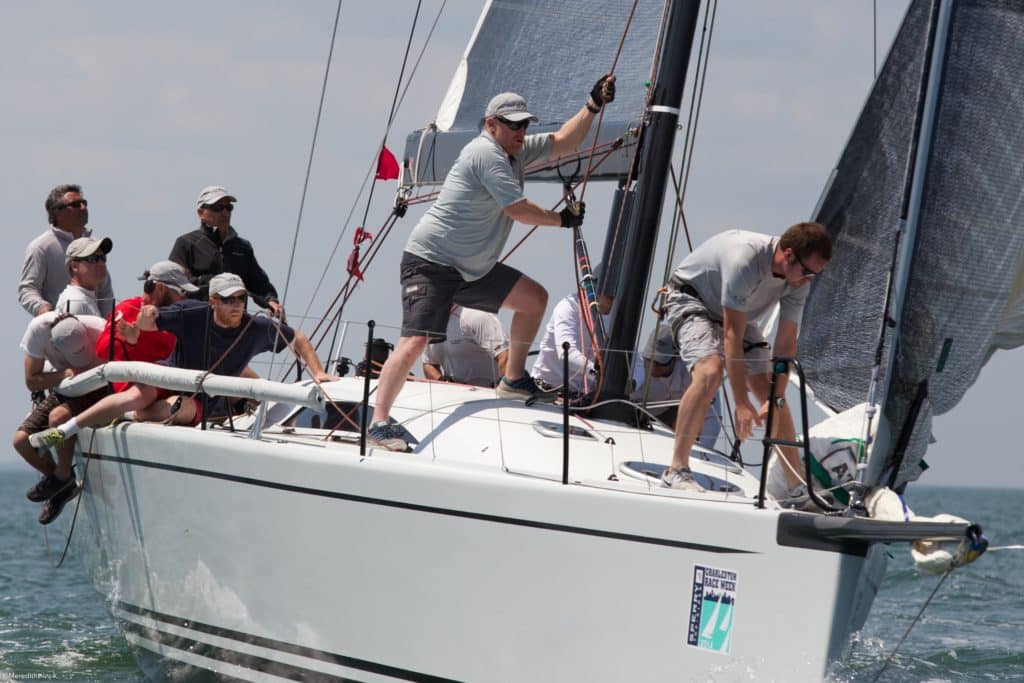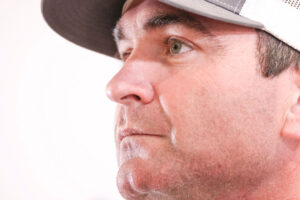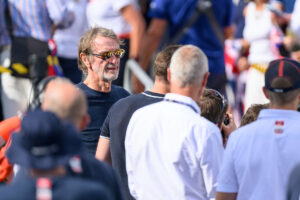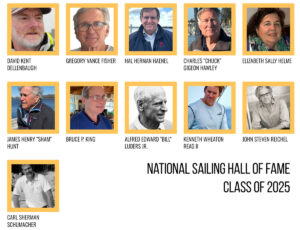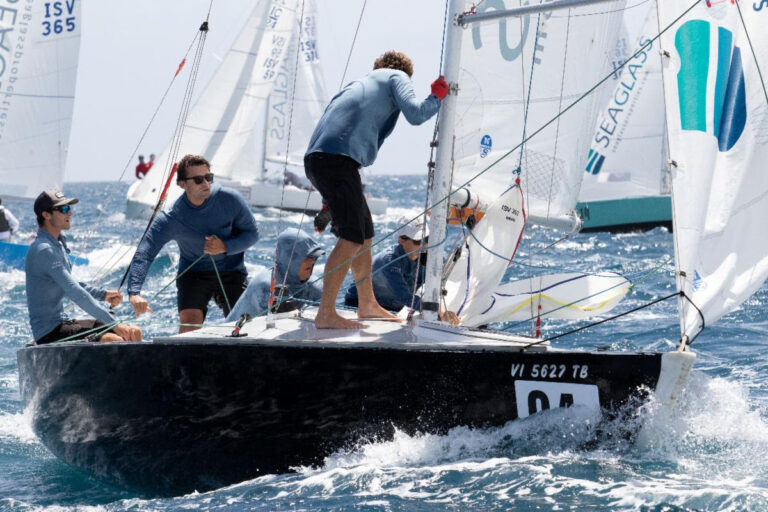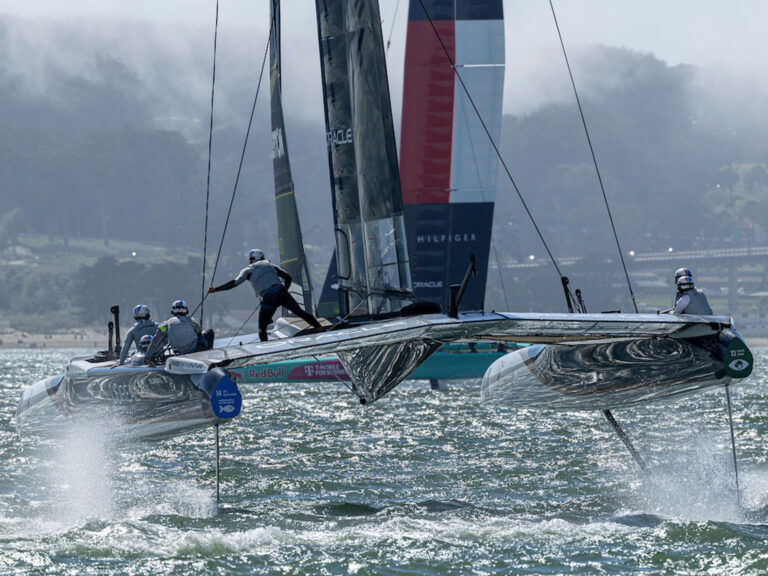When the racing was all said and done in the water’s off Charleston, S.C., the crew of John Cooper’s Mills 43 Cool Breeze had no idea they’d won Sperry Top-Sider Charleston Race Week’s Palmetto Cup, the trophy bestowed upon the boat with the best overall performance in the handicap classes. Like many sailors on the last day of a regatta, most of the 12-man crew were already either airborne or highway bound when sole crewmember Kyle Fast was called to the prize table to grab the regatta’s big prize.
“It was a complete surprise,” says tactician and program manager Billy Liberty. “We sent Kyle Fast over to pick up our trophy [for PHRF A], and I think he was as shocked as the rest of us to be grabbed for the second trophy.”
Ask any past recipient and they’ll tell you the Palmetto Cup doesn’t come easy, and that’s especially true these days at Charleston Race Week, where the teams are high-caliber and the conditions always challenging (especially the early morning boat call). For Cool Breeze, says Liberty, winning the PHRF A division meant fighting for every point against a few supremely sailed competitors. To learn more, we tracked down Billy Liberty to get the scoop on Breeze’s big win, and here’s what he shared with us.
John Cooper is a pretty low-profile owner, and obviously, an excellent helmsman; what’s his background?
The family lives in Springfield, Mo., where he grew up, and where the family business is based. They sail a lot on Stockton Lake in Cane Hill. It’s a real-deal local club scene, where the afternoon BBQ is as important as the racing they do. They’re close knit bunch, and as homegrown as you can imagine. He grew up on the J/29 that his dad bought back in 1983. We still have it in the program. He’s got a J/27 on the lake and he and his friends have a J/22 that they keep in Aspen, Colo., They’re really into it. The whole thing about having the boat [the Mills 43] on the East coast is being able to come to the coast and race the big events, from Key West to Block Island and Newport, and anything in between like Charleston. He’s low key, a bit behind the scenes, but he loves just being able to go racing.
That’s a lot of events; how do you manage the crew pool?
We don’t pay anyone to go sailing. Nobody is paid, period, unless you’re fixing or sanding something. The program has always had a good nucleus of guys that love coming sailing with us. They’re not getting paid. They’re just getting fed well. It’s a great group of people, the kind of people you always want at the dinner table. There are probably 50 guys on the list that we can pull from and every one of them is someone we’d want to have dinner with. That’s the way we group up sailing and that’s the way it is.
OK, so back to Charleston: what was the difference this year?
Cool Breeze is heavy boat, but this time we went more aggressive with the rig tune. We made it really loose and sloppy so we could compete with the lighter boats like the J/111s and J/122s that in the past have always hurt us.
We took a lot of tension off the diagonals and the cap shrouds. The rig was just flopping around like a noodle. It was really sagging off to leeward, which really powered up the main and gave us all the power we needed to get the bow pointed high against the 111s, specifically. Really sloppy on the rig tune is unnerving on big boats—to have the rig slamming around in the chop—but it was fast.
Even with a couple of embarrassing starts we were able to find a lane, get clear air, and just leg out a little bit. We were kind of slow downwind, but upwind we kept finding the right lanes.
I don’t think we did anything magical on the water. It just worked out for us at times. We were kind of shuffling races around with Teamwork (Robin Team’s J/122). Every time we can beat Teamwork we’re firing on the right cylinders. They’re as good of a program as any, and if we can beat them, we know we’ve done something right. They don’t give anything away for free, and they leave nothing on the table.
We were looking forward to racing against them because we didn’t do well in Key West. Key West was a wake up call for us. We know Teamwork has always been very good, and if we can compete with them we’re getting back in to our groove. We may have beaten them this time, but that’s never a guaranteed. That’s the same with Spaceman Spiff [Rob Ruhlman’s J/111]. They were going very fast and could’ve taken it away from us in a heartbeat.
It came down to the last race we sailed. I picked the better side than Teamwork. They were beating us at the leeward mark, but going up the beat I had the better side and that’s all it came down to.
We were tight reaching into the leeward marks; we both got headed. We did a leeward drop and shot out to the left side of the beat and they did a Mexican and went to the right side. I felt there was better pressure on the left, and I guess they felt they were in phase. But the pressure stayed solid on the left and we made up our lost time. They had us on that run, though.
When a program like this has months between events, there’s a lot of starting over; how do you guys stay consistent?
It does feel like a re-start every time, but we always three or four core guys from Missouri, a couple of guys from Seattle, and the rest of us are from the Connecticut/Rhode Island area. Some are from New Jersey and Charleston. For us, the whole program is a different concept. We love attending these events, and sometimes the guys haven’t sailed on the boat for four or six months, but we are a good group of friends that like to eat together and having great dinners. I think we’re more foodies than sailors, to be honest. That’s been the true deal of our program for a long time. We’re deep in the wine list and have good food.
Who manages the crew pool?
We don’t have a full time boat captain. We only crew up for the events. For the events we’ll bring in a few guys to do the preparation. We rely on a lot of the Kings Point guys. We’ll bring them in for an event to help prepare the boat or do deliveries. The boat goes from event to event on its own bottom—the boat’s never on a truck. A lot of these guys are part of the team and on board. There are a handful of them that are always looking to go racing and move the boat offshore. It’s great to have some of these engineers onboard for an offshore delivery; you never worry about things breaking because they’re on top of it before it can happen. I always say we prefer to pay team members than truckers that don’t know the first thing about sailboats.
Who’s responsible for the work list?
I am. I’m not the guy with the tools, but I know who to give the work list to and what to have ready and they get it done. It’s all about logistics and bringing the right people to do the right jobs at the time; changing out deck gear, servicing winches, etc. The Quantum guys have always done great sails for us. We don’t buy a lot of sails, but we do manage the hours on them smartly. We’re always re-cutting sails and getting every last hour out of the available sails. We buy more wine than we do sails. I can promise you that.
